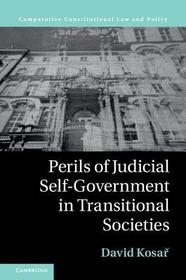
Perils of Judicial Self-Government in Transitional Societies
The Least Accountable Branch
Series: Comparative Constitutional Law and Policy;
- Publisher's listprice GBP 130.00
-
62 107 Ft (59 150 Ft + 5% VAT)
The price is estimated because at the time of ordering we do not know what conversion rates will apply to HUF / product currency when the book arrives. In case HUF is weaker, the price increases slightly, in case HUF is stronger, the price goes lower slightly.
- Discount 10% (cc. 6 211 Ft off)
- Discounted price 55 897 Ft (53 235 Ft + 5% VAT)
Subcribe now and take benefit of a favourable price.
Subscribe
62 107 Ft

Availability
Estimated delivery time: In stock at the publisher, but not at Prospero's office. Delivery time approx. 3-5 weeks.
Not in stock at Prospero.
Why don't you give exact delivery time?
Delivery time is estimated on our previous experiences. We give estimations only, because we order from outside Hungary, and the delivery time mainly depends on how quickly the publisher supplies the book. Faster or slower deliveries both happen, but we do our best to supply as quickly as possible.
Product details:
- Publisher Cambridge University Press
- Date of Publication 1 April 2016
- ISBN 9781107112124
- Binding Hardback
- No. of pages488 pages
- Size 229x152x27 mm
- Weight 820 g
- Language English
- Illustrations 6 b/w illus. 32 tables 0
Categories
Short description:
This book investigates the mechanisms of judicial control to determine an efficient methodology for independence and accountability.
MoreLong description:
Judicial councils and other judicial self-government bodies have become a worldwide phenomenon. Democracies are increasingly turning to them to insulate the judiciary from the daily politics, enhance independence and ensure judicial accountability. This book investigates the different forms of accountability and the taxonomy of mechanisms of control to determine a best practice methodology. The author expertly provides a meticulous analysis, using over 800 case studies from the Czech and Slovak disciplinary courts from 1993 to 2010 and creates a systematic framework that can be applied to future cases.
'Kosar&&&780; ... relies on more than 800 case studies from the Czech and Slovak disciplinary courts from 1993 to 2010 to analyze differing forms of accountability of the least accountable branch of government: the judiciary. The volume's first part lays the theoretical framework that informs the empirical analysis presented in chapters 4 to 7. It defines judicial accountability, describes its mechanisms, and overviews the role of judicial councils in insulating the judiciary from politics, enhancing its independence, and thus ensuring judicial accountability. Chapter 4 comments on the methodology of the empirical research, explaining case selection and case analysis, whereas chapters 5 to 7 compare cases from the Czech and Slovak Republics. The final chapter serves as a conclusion, arguing that the judicial council increases judicial autonomy without necessarily improving the independence of individual judges. Recommended.' L. Stan, Choice
Table of Contents:
Introduction; Part I. Judicial Accountability: Theoretical Framework: 1. The concept of judicial accountability; 2. Mechanisms of judicial accountability; 3. Judicial accountability and judicial councils; Part II. Holding Czech and Slovak Judges Accountable: 4. Prologue to the case studies: methodology and data reporting; 5. The Czech Republic; 6. Slovakia; 7. Evaluation: the Czech Republic and Slovakia compared; Part III. Conclusions and Implications: 8. Judicial accountability and judicial councils: critical appraisal; Annexes.
More

Desert Geomorphology
15 760 HUF
14 184 HUF

The Environment in World History
64 496 HUF
58 047 HUF

Fundamentals of Health at Work
42 997 HUF
38 698 HUF



